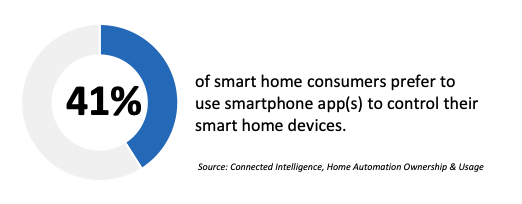
Apple Announces New HomeKit Features
During the 2020 Worldwide Developers Conference, Apple announced a string of HomeKit updates to come along with iOS 14. Suggestion Automations provides…well, suggested automations for compatible devices – such as disarming a security system when a smart lock is unlocked. Adaptive Lighting will automatically adjust color temperature, with cooler temperatures during the day and warmer temperatures at night. Face Recognition, part of the updated Secure Video API for HomeKit-enabled cameras, will…recognize people. In addition, HomePods will be able to announce when someone is at the door and Apple TV will have picture-in-picture live views of who is ringing the doorbell.
The NPD Take:
- These updates make iOS far more integrated than ever with HomeKit, for example by leveraging facial recognition built into Apple Photos to enable HomePod to make those visitor announcements. These deeper integrations will make the smart home run that much smarter and smoother. Meanwhile, Suggested Automations hopefully will go a long way for those consumers who are less tech savvy and just need things to work. The fact that HomeKit does a lot of local data processing rather than sending things to the cloud should appeal to the privacy conscious consumer.
Samsung is Shaking Up SmartThings
Sometime over the course of the next year, Samsung is planning to open up and offer its software to other companies…so theoretically we can expect to see more manufacturers making SmartThings hubs and compatible devices. The company also plans to push users of its legacy app to the “new” app SmartThings app that launched back in 2018. Finally, there are some more changes on the backend for developers meant to help improve device performance (latency, reliability, etc.), though most details have not yet been revealed, other than requiring developers to access an API, rather than writing their own code.
The NPD Take:
- As successful as Samsung has been with building smart TVs and smart home appliances, the success has not yet been mirrored with their own smart home platform and compatible home automation devices. The brand does have the highest market share in smart home hubs, but in a $15M market that shrank by 6% in 2019 (according to NPD Group US Monthly Retail Tracking), the milestone isn’t overly notable. Samsung says the changes it is making to SmartThings will make it easier for consumers to connect and control all of their devices running on the platform – but first they would have to buy.
Eufy Enters the Home Security System Ring
Anker’s sub-brand Eufy introduced a 5-piece smart home security system with a list price of $160. Those five pieces include one motion sensor, 2 contact sensors, a base station, and wireless keypad. The motion sensor is meant to work in tandem with Eufy’s security cameras, not included as part of the kit.
The NPD Take:
- Eufy definitely has a price advantage. Ring’s basic 5-piece kit, as a comparison example, retails for $200. Yet, there is little reason to believe that anyone who is already beholden, for example, to the Ring brand and is looking to add on a security system would jump to Eufy instead. The system should appeal to the current Eufy camera owner, however, as well as to those consumers who are just starting to build out their home security plans and need a more budget friendly option.


